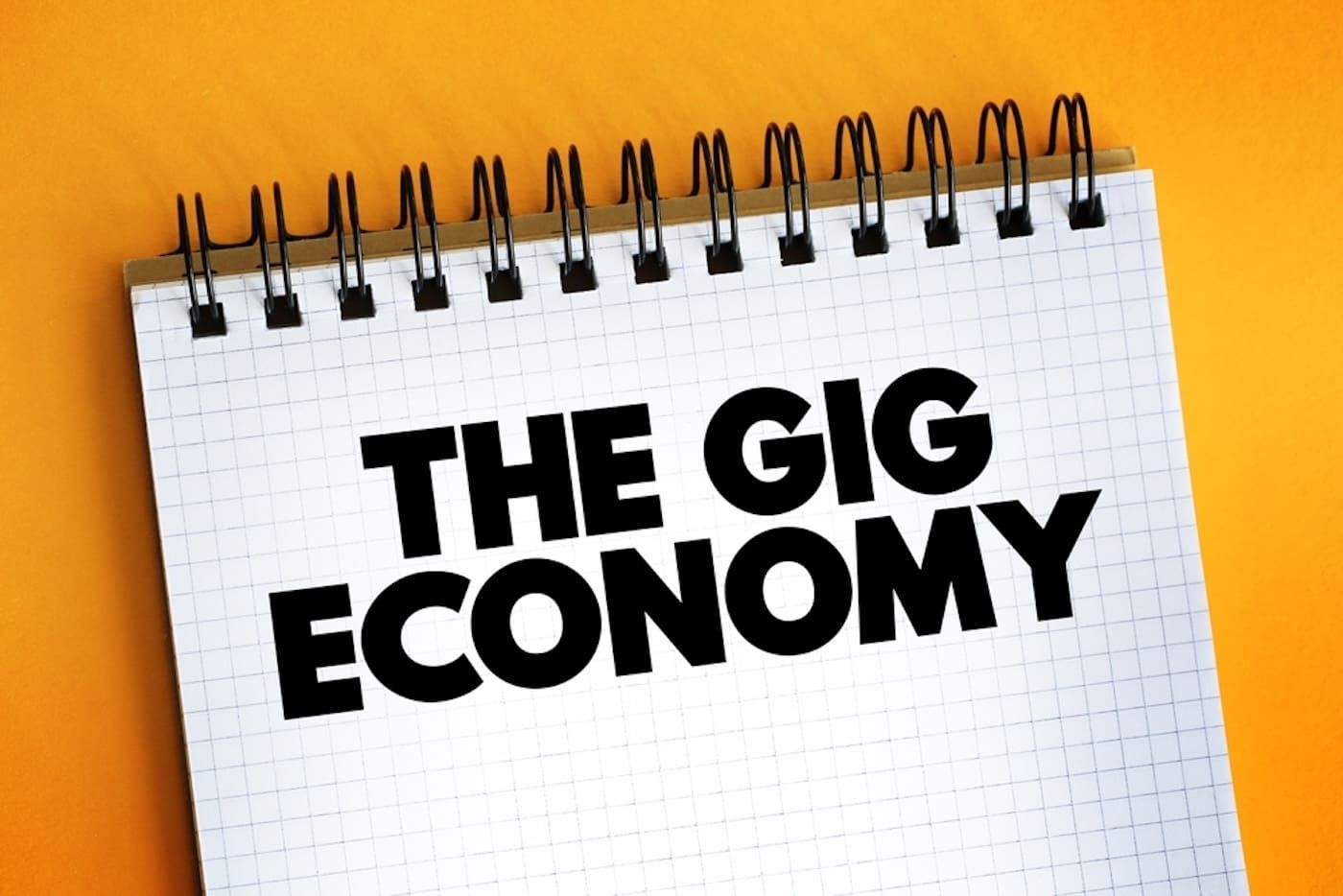What Is The Gig Economy? The Complete Guide For 2024
By Adrian Mole Updated: Feb 08, 2024

How the gig economy is changing the future of work and supercharging profits in 2024!
An understanding of what the gig economy is and how it affects you is crucial for your financial future, given current changes in the workplace.
The labor market is being redefined as the gig economy provides individuals short-term, freelance, and on-demand contract work instead of full-time employment.
Here’s what you need to know about gig work and how to maximize the available opportunities.
What Is The Gig Economy?
The gig economy is nothing new; it’s been around for centuries, offering workers opportunities to sell their labor on a temporary basis.
What is new, however, is the organized use of online platforms that provide easy access to the best gig economy jobs for companies and individuals.
This has turned traditional employment upside down, offering companies opportunities to reduce costs while giving workers new-found control over their futures.
The gig economy comprises a wide variety of work that does not require a staff member to operate from a company’s premises.
Any job offered on a gig app or through digital technology that a freelancer or independent contractor can complete is considered part of the gig economy.
Employers advertise the availability of tasks or jobs for project-based workers, either as temporary or part-time hires, usually on an hourly or per-project basis.
Why Is It Called The Gig Economy?
The term "gig economy" is familiar to musicians and performers who originally coined the phrase in reference to short-term engagements or temporary work.
Jazz musicians first used the term early in the 20th century, later becoming the standard description for performing at concerts and shows.
With the advent of organized, technology-based temporary and part-time positions, this new labor market became known as the gig economy.
In the same way that musicians were engaged to perform “gigs,” individuals working on short-term contracts rather than being full-time, permanent employees became gig workers.
The flexible and temporary nature of the work arrangements in this type of economy allows individuals to work for multiple clients on different projects.
While the gig economy allows for greater flexibility and independence, it also lacks the job security and benefits associated with traditional workers' jobs.
The
best gig economy jobs can offer individuals a combination of flexible working hours together with a reasonable hourly wage.
How The Gig Economy Works
The gig economy model differs from traditional jobs in that work is temporary, flexible, and often short-term.
Anyone wishing to explore this new job market should weigh the
gig economy's pros and cons before diving into this dynamic work landscape.
Employers offer work to independent contractors, freelancers, or on a part-time basis rather than engaging full-time employees.
Here's how the gig economy works:
Platform-Based Work
Jobs or “gigs” are advertised through online platforms and apps, which serve as intermediaries connecting service providers with customers or clients.
The proliferation of various platforms, including Uber, Lyft, Airbnb, Upwork, and TaskRabbit, set the scene for the
expansion and adoption of the gig economic model.
To make the most of one’s opportunities, you should stay updated with the evolving
gig economy trends shaping the future of work.
Independent Contractors
A gig worker applies for the job and is engaged as an independent contractor or freelancer, not an employee of the company or platform they work for.
This gives individuals greater control over their schedules and work arrangements but lacks traditional employment benefits like health insurance, paid vacation, or retirement plans.
It is important that you understand the importance of
gig economy insurance for limiting freelancers' liability and security.
Flexibility
A big drawcard of the gig economy is flexibility, with a gig worker able to choose when and for how much they want to work.
This flexibility allows younger workers to balance work-life responsibilities more easily or pursue multiple gigs simultaneously with the benefit of increased earnings.
Job Variety
The variety of jobs available to the gig workforce is enormous, from freelance writing, graphic design, and social media management to driving for ride-sharing platforms.
Companies are prepared to pay well for administrative, accounting, legal, and creative jobs that require nothing more than a laptop, cellphone, and an internet connection.
Following the latest news from the
biggest gig economy companies leading this revolution, you can find a job that best suits you.
Payment Structure
Workers are paid per hour, task, project, or gig, with payments varying depending on the type of work, platform, and demand for their services.
Gig workers can increase their earnings by receiving tips or bonuses based on performance as well as by providing more advanced services.
Each
gig economy platform allows freelancers and independent contractors to access the most lucrative and suitable options in their market.
Rating and Reviews
A feature of many gig economy platforms is the inclusion of rating and review systems, allowing customers or clients to rate their experiences with each worker.
These ratings then affect a gig worker's ability to secure future work, with customers relying on these reviews to make buying decisions.
Digital Technology
One of the key components of the gig economy is the technology deployed via mobile apps and websites that make it easy for workers to find job opportunities.
Once the worker secures a gig, they can then communicate with their clients, keep track of their earnings, and manage deadlines and work schedules.
Legal and Regulatory Issues
As the gig economy matures,
gig worker law and regulatory issues become more important, with gig workers being defined as independent contractors in some countries.
The status of workers has been the subject of debate, and legal challenges in many regions have resulted in the imposition of government regulations.
These regulations seek to ensure that workers enjoy certain labor rights and protections they have not previously had.
Economic Impact
The advent of the gig economy has significantly impacted the labor market and the broader economy, especially since worldwide lockdowns in 2000.
With the move by many companies to a remote work model, the gig economy trend was given a boost that allowed many more workers to enter the international job market.
This allowed many freelancers to achieve greater financial stability using effective
financial tips and tricks tailored for gig economy workers.
What Is A Gig Worker?
A gig worker, in the context of the gig economy, is a worker who receives a contract for a certain amount of time rather than full employment.
Gig workers aren’t employed in the same way as traditional employees but rather as self-employed individual contractors with greater flexibility in how they perform their work.
A key characteristic of these workers is their freedom to choose when and where they work, often servicing multiple clients or gigs simultaneously.
The process of
becoming a freelancer isn’t difficult if you follow a plan listing your skills and experience before searching the job platforms.
Examples of Gig Work
The gig economy offers an almost limitless number of work opportunities for skilled and semi-skilled workers across multiple industries and job categories.
If you have access to a computer, cellphone, and internet connection, here are ten gig economy examples to help you decide on a suitable job:
- Rideshare Drivers who work for companies like Uber or Lyft provide transportation services directly to passengers.
- Food Delivery Drivers offer their services to companies like DoorDash, Uber Eats, or Grubhub, delivering food orders to customers' homes.
- Task Runners use platforms like TaskRabbit to connect them with various clients who need tasks such as furniture assembly, moving, or handyman work completed.
- Freelance Writers may offer their writing skills for content creation, blog posts, and other written materials on a multitude of freelance platforms.
- Remote Software Developers are in great demand, working on projects, such as web or app development and database projects.
- Virtual Assistants allow businesses to outsource their administrative tasks, scheduling, and email management.
- Online Tutors with expertise in subjects such as math, languages, or test preparation utilize online tutoring services to connect with clients across the world.
- Graphic Designers use platforms like Fiverr to present their freelancer portfolios and offer clients visual content, logos, and assorted branding materials.
- Event Planners can work on a gig basis to help organize and coordinate events, such as weddings or corporate functions.
- Social Media Managers handle social media accounts for businesses, posting content, engaging with followers, and monitoring analytics.
These are just a few opportunities you can pursue as your primary income or as a side hustle.
How Are Gig Workers Paid?
There are a variety of ways that workers are compensated for gigs, such as per assignment, retainer, per task, hourly wages, or other agreed-upon systems.
The payment structures also vary depending on the specific gig and platform, with drivers, for example, earning money for each ride or delivery.
Freelancers on platforms like Upwork or Fiverr charge their clients per project, milestone, or hourly rate, with a small fee paid to the platform.
Task Or Project-Based Payment
Workers may receive payment for each task or project they complete either as a fixed amount or based on complexity or volume.
Independent contractors often receive payments contract-to-contract, negotiating terms with their clients with agreed-upon payment schedules and amounts.
Some gig fees are based on the completion of an entire project, or they may be tied to specific project milestones.
Temporary hires and part-time workers may receive hourly wages for the time they spend working on a gig based on predetermined parameters.
Additional income is received through tips and bonuses, especially with ride-hailing or food delivery jobs, with customers having the option to reward excellent service.
Sales and commission-based workers earn a portion of the sales they generate, often as a percentage of the total sales value.
Payment Arrangements Vary
It's important to note that payment arrangements vary significantly depending on the platform or industry workers operate in.
Gig workers are responsible for managing their own taxes, as they are typically considered self-employed or independent contractors.
This requires that individuals keep accurate records of their income and expenses and submit tax returns to the tax authorities in their country.
As they are not generally eligible for traditional employment benefits like health insurance or retirement plans, they must arrange these themselves.
The Rise of The Gig Economy
The rise of the gig economy can be attributed to a combination of economic, technological, and cultural factors, specifically the proliferation of the internet.
The widespread adoption of the internet and the development of digital platforms have made it easier for individuals to connect with potential employers or clients.
The best gig economy stocks like Uber, Airbnb, Upwork, and TaskRabbit have facilitated the gig economy by easily matching independent workers with those needing their services.
For businesses, especially startups and those with minimal capital, hiring independent workers can be more cost-effective than employing full-time workers.
Most Popular Gig Economy Jobs
The most popular gig jobs have the lowest barrier to entry, with food delivery drivers and freelance writing the leading entry-level jobs.
For those with additional qualifications, such as degrees or higher certificates,
specialized tutoring services can be an extremely lucrative option.
1. Food Delivery
Food delivery is an ordinary gig job in the gig economy, where individuals work as independent contractors for platforms like Uber Eats or DoorDash.
They gain flexibility by choosing when and how often to work, making it suitable for those seeking part-time or temporary positions.
2. Freelance Writing
Freelance writing is another gig job that requires minimal skills, with freelancers providing written content for a multitude of clients and publications.
This type of work offers flexibility in terms of choosing projects and working hours, but the rise of AI is already impacting the availability of jobs.
3. Online Tutoring
Online tutoring is a gig opportunity that allows individuals to offer their expertise in various subjects or skills through online platforms.
It provides flexibility and the ability to work from home, but independent workers may need to acquire additional qualifications to secure new clients and gigs.
Pros & Cons Of The Gig Economy
The
gig economy's pros and cons are numerous for businesses and workers, with greater flexibility and access to specialized services but with some serious challenges.
Job insecurity and the lack of traditional benefits packages are significant drawbacks for workers with families, especially those needing medical cover.
Benefits of Working In The Gig Economy
The gig economy allows businesses to scale their workforce based on demand, making it easier to adapt to changing market conditions and project requirements.
Independent workers are free to
choose when and where they work, with the ability to pursue multiple gigs or side hustles simultaneously.
Gig work provides opportunities to diversify income sources, reducing financial dependency on a single employer.
Businesses can tap into a wide range of specialized skills and expertise, often on a project-by-project basis, without hiring permanent staff.
Companies reduce the overhead costs associated with full-time employees, such as benefits, assets, and office space.
Drawbacks of Working In The Gig Economy
Gig workers often face irregular income as they rely on short-term contracts and projects.
Independent workers typically do not receive traditional employment benefits such as health insurance, retirement plans, paid time off, or sick leave.
Gig workers lack the job security that traditional employees have, with no assurance of continued work.
Independent workers often miss out on employer-sponsored training and development opportunities, limiting their ability to acquire new skills.
Working in the gig economy can be isolating, as many gig workers operate independently and remotely.
The gig economy has transformed how people work and hire, presenting opportunities and downsides that individuals and organizations should consider carefully.
Best Gig Economy Platforms
To take advantage of the gig economy, look no further than the following platforms where you can start looking for freelance jobs:
1. Upwork
Upwork is a versatile method designed to connect clients and freelancers. Clients can find talent with a wide range of services, from writing and graphic design to software development.
It's known for its diverse user base and project variety, making it suitable for freelancers of different skill levels and experience.
Upwork allows freelancers to bid on projects, which can be competitive, and offers a range of payment structures, including hourly and fixed-rate contracts.
With the advent of artificial intelligence, AI-related jobs are experiencing unprecedented interest, with an almost
400% growth in gigs.
2. Fiverr
Fiverr is distinct in its approach, offering a marketplace where freelancers showcase their services as "gigs" with predefined deliverables and prices.
Clients can easily browse these services, making it a user-friendly platform for those seeking specific, well-defined tasks like logo design, voiceovers, or content writing.
Unlike Upwork, Fiverr doesn't involve project bidding; clients directly select the services they need based on the freelancer’s rating and portfolio.
3. Toptal
Toptal stands out as a platform exclusively for top-tier freelancers and clients in the tech industry with rigorously screened and selected freelancers.
This ensures high expertise, connecting clients with software developers, designers, and finance experts for long-term, often high-budget projects.
Toptal focuses on quality over quantity, distinguishing itself from more generalist platforms like Upwork and Fiverr by concentrating exclusively on top talent.
4. PeoplePerHour
PeoplePerHour is known for its focus on connecting freelancers in the creative and digital industries with clients requiring projects from web development to marketing services.
Successful freelancers create profiles showcasing their skills and expertise, and clients can post specific project requests on which individuals can bid.
This platform combines elements of project-based work and hourly contracts, allowing flexibility in project arrangements for both clients and contractors.
5. LinkedIn
LinkedIn is a professional networking platform that has evolved to include gig economy elements, with freelancers listing their skills and services on their profiles.
It offers a passive way to attract clients, with individuals having the opportunity to share their expertise through blog posts and articles.
LinkedIn's approach differs from the other gig economy platforms by integrating gig work opportunities into its broader professional networking ecosystem.
How To Get Started In The Gig Economy In 2024 (Step-By-Step)
Starting a lucrative side hustle or earning extra income in the gig economy is as simple as following these five steps:
Step 1: Choose Your Gig
The first step to starting in the gig economy is to choose a specific gig or type of work that aligns with your skills, interests, and experience.
Consider what you enjoy doing, what you are good at, and what opportunities are available in your area.
You could consider gig work like a ride-hailing service or food delivery, as
demand is growing and it has a low barrier to entry.
Step 2: Set Your Rate
Before you invest time and resources into pursuing a gig, it's essential to understand how much you can expect to earn.
Research expected earnings for your chosen gig by searching on the platforms listed above, taking into account any platform fees and taxes that may apply.
Ensure that the rate you earn will support you, factoring in expenses, such as additional car insurance if you're a professional driver or marketing costs.
Step 3: Choose Your Gig Platform
Independent workers rely on online platforms to find clients, deliver services, manage billing, and determine which offers the most benefits for their chosen gig.
Each platform caters to specific types of work, with Uber and DoorDash popular platforms for drivers, while Upwork, Fiverr, and Freelancer are
better for online work.
Step 4: Manage Your Taxes
Independent consultants are responsible for managing their own taxes, so it is crucial that you understand how self-employment taxes work.
You need to know how much to set aside for the Internal Revenue Service (IRS) and be aware of quarterly tax deadlines.
Missing these deadlines can lead to penalties, so consult an accountant or tax professional to help you navigate your tax responsibilities.
Step 5: Be Careful of Burnout
The stress of working in the freelance economy should not be underestimated, as the uncertainty of gig work can lead to high-stress levels.
Prolonged stress can leave you tired, demotivated, depressed, and anxious, leading to various health problems that may result in a lack of energy and irritability.
Summary
Now that you know more about the gig economy, its opportunities may not suit everyone as it’s more like starting your own business.
Aside from the skills needed to fulfill specific freelance jobs, you’ll also need to master marketing your services and stay motivated when gigs are scarce.
Despite the challenges, the gig economy is filled with opportunities, with plenty of companies looking for well-qualified and experienced freelancers.
Adrian Mole is a UK-based Chartered Accountant and Chartered Tax Adviser. With a career spanning over 30 years, he has advised clients of all sizes on accounting, business, and tax matters and has a passion for helping startups. Formerly a partner of a Top Ten accounting firm in London, he now runs a small accounting practice closer to home with a committed team of finance professionals. A private pilot and keen scuba diver, when not working, he enjoys time with his family and teaching Ballroom dancing.
– Recommended Reads –
The information found on this website is for general purposes only and should not be considered financial advice. The Positive Accountant is an opinion and information based website only. Please do your own research and consult with a qualified professional before making any financial decisions.




